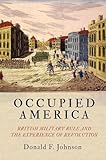Occupied America : British Military Rule and the Experience of Revolution / Donald F. Johnson.
Material type: TextSeries: Early American StudiesPublisher: Philadelphia : University of Pennsylvania Press, [2020]Copyright date: ©2021Description: 1 online resource (304 p.) : 15 illusContent type:
TextSeries: Early American StudiesPublisher: Philadelphia : University of Pennsylvania Press, [2020]Copyright date: ©2021Description: 1 online resource (304 p.) : 15 illusContent type: - 9780812297454
- 973.3/41 23/eng
- E208
- online - DeGruyter
| Item type | Current library | Call number | URL | Status | Notes | Barcode | |
|---|---|---|---|---|---|---|---|
 eBook
eBook
|
Biblioteca "Angelicum" Pont. Univ. S.Tommaso d'Aquino Nuvola online | online - DeGruyter (Browse shelf(Opens below)) | Online access | Not for loan (Accesso limitato) | Accesso per gli utenti autorizzati / Access for authorized users | (dgr)9780812297454 |
Browsing Biblioteca "Angelicum" Pont. Univ. S.Tommaso d'Aquino shelves, Shelving location: Nuvola online Close shelf browser (Hides shelf browser)

|

|

|

|

|

|

|
||
| online - DeGruyter Subscription Theater : Democracy and Drama in Britain and Ireland, 1880-1939 / | online - DeGruyter The Visigothic Kingdom in Iberia : Construction and Invention / | online - DeGruyter Perspectives on Fair Housing / | online - DeGruyter Occupied America : British Military Rule and the Experience of Revolution / | online - DeGruyter Meter and Modernity in English Verse, 1350-1650 / | online - DeGruyter The Corrupter of Boys : Sodomy, Scandal, and the Medieval Clergy / | online - DeGruyter Book Traces : Nineteenth-Century Readers and the Future of the Library / |
Frontmatter -- CONTENTS -- Introduction. The Experience of Occupation -- Chapter 1. Revolutionary Occupations -- Chapter 2. Collaborator Regimes -- Chapter 3. Within the Lines -- Chapter 4. Starving amid Plenty -- Chapter 5. Ambiguous Allegiances -- Chapter 6. Making Peace -- Epilogue. Forgetting Occupation -- Notes -- Index -- Acknowledgments
restricted access online access with authorization star
http://purl.org/coar/access_right/c_16ec
In Occupied America, Donald F. Johnson chronicles the everyday experience of ordinary people living under military occupation during the American Revolution. Focusing on day-to-day life in port cities held by the British Army, Johnson recounts how men and women from a variety of backgrounds navigated harsh conditions, mitigated threats to their families and livelihoods, took advantage of new opportunities, and balanced precariously between revolutionary and royal attempts to secure their allegiance.Between 1775 and 1783, every large port city along the Eastern seaboard fell under British rule at one time or another. As centers of population and commerce, these cities—Boston, New York, Newport, Philadelphia, Savannah, Charleston—should have been bastions from which the empire could restore order and inspire loyalty. Military rule's exceptional social atmosphere initially did provide opportunities for many people—especially women and the enslaved, but also free men both rich and poor—to reinvent their lives, and while these opportunities came with risks, the hope of social betterment inspired thousands to embrace military rule. Nevertheless, as Johnson demonstrates, occupation failed to bring about a restoration of imperial authority, as harsh material circumstances forced even the most loyal subjects to turn to illicit means to feed and shelter themselves, while many maintained ties to rebel camps for the same reasons. As occupations dragged on, most residents no longer viewed restored royal rule as a viable option.As Johnson argues, the experiences of these citizens reveal that the process of political change during the Revolution occurred not in a single instant but gradually, over the course of years of hardship under military rule that forced Americans to grapple with their allegiance in intensely personal and highly contingent ways. Thus, according to Johnson, the "idian experience of military occupation directly affected the outcome of the American Revolution.
Mode of access: Internet via World Wide Web.
In English.
Description based on online resource; title from PDF title page (publisher's Web site, viewed 01. Dez 2022)


